Galton & Simpson - Big interview
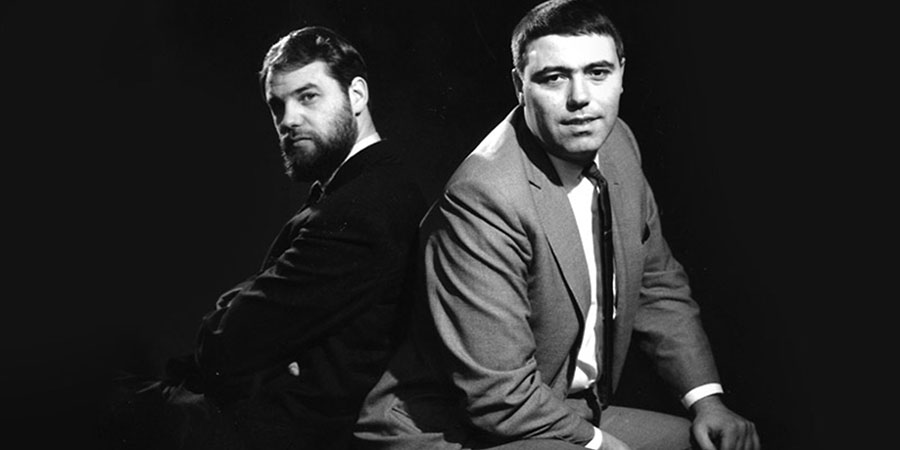
With Comedy Playhouse back for a new (albeit short) season of BBC One sitcom pilots, we spoke to Ray Galton and Alan Simpson, the legendary writing duo behind Steptoe And Son, Hancock's Half Hour and much more, for whom, back in 1961, Comedy Playhouse was originally created.
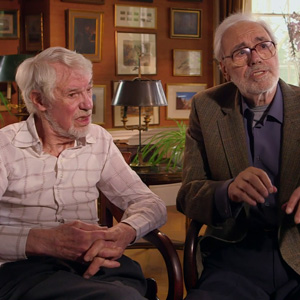
The story of your meeting is pretty well-known now: you were in a tuberculosis sanatorium together shortly after World War II...
Ray: Yes, that's it. Someone in another ward had an RAF 1155 radio, on which we picked up Ameican Forces Network AFM Munich-Stuttgart, which we'd listened to during the war when they were over here. We used to share it, British, American and Canadian.
Alan: And the BFN in Hamburg, there was a programme that used to broadcast all these American shows during the war. That was between 1940 and '45. Then in '47 we were both taken ill, met, and we found we both knew about, listened to and were fans of these same shows, which of course continued when we got hooked up with this bloke's radio.
Ray: We weren't just interested in American shows, it's just that American shows that were on during the war, and once the war was over American troops had their network only in Germany, and you couldn't get it here unless you had a very good radio set-up. So he had this radio and would string out a wire between friends who wanted to listen. He was an engineer, the whole room was like an engineering workshop! So he and another guy, in their pyjamas, put a network - hand-made - into the whole of the sanatorium, creating a little radio room as well. We had amplifiers, a turntable, microphones; so when Alan and I got to ask the radio committee whether they wanted a radio show, they said 'Yeah', we said 'Good!', so we started writing 6 and dried up after 4! So we did that. That's how we started in the sanatorium.
Alan: That was the first time we'd ever written together. Neither of us had really written [at all]. I'd been a member of a concert party and used to do bits and pieces I'd nicked, nearly all from films, American stuff, Red Skelton, stuff like that.
Ray: One thing I must say, we weren't just fans of American humour, we were fans of English humour as well, but there were a lot of shows on the American network that we enjoyed. We used to read a lot as well...
Alan: And we saw a lot of films, we found we had mutual tastes in pre-war films: Will Hay, that type of thing. He used to make at least one, maybe two films a year. They were wonderful, still are! A quick three weeks' shooting for an hour-and-a-quarter type films.
So... that's how we really started. And whilst we were writing those four shows, we wrote a letter to Frank Muir and Denis Norden asking if we could come and join them as office boys once we got out of the sanatorium, and learn how to do it. Thinking, in our naivety, that they'd say "Oh what a good idea!", meanwhile we'd be spying on them and seeing how they did it.
I'm jumping the gun a little here, but they sent a nice letter back saying that if we had any ideas, the best way of getting in would be to send a letter to Gale Pedrick who was a script editor at the BBC. Well, then we dried up, and a year went by until we started writing again. I went back to this concert party, there was no way I could appear on it but they said 'Have you got any ideas?' so I said I'd have a word with my erstwhile writing partner. Ray wasn't working at this point -
Ray: I still wasn't allowed to work at this point, not fit enough.
Alan: - so he used to get on the bus, come over to my house and we wrote some sketches for this concert party. And having started writing again we did what Muir & Norden suggested. We wrote a sketch based on the Take It From Here last sketch, which used to be a sort of pastiche on a play or film, a book or just a generic theme. Trouble at the mill, north-country industrial, these kind of things. And they'd do 8 or 9 minute sketches. So we wrote one of those and sent it in to the BBC. They liked it, one thing lead to another, and within about 3 or 4 weeks we met a comedian called Derek Roy and we'd started writing bits for him! 25 shillings - 25 pence - a time, per gag accepted, and that's how it all started!
It all happened in a rush really. At the time, a week is a long time when you're that age, around 20, but in actual fact it all happened quickly, especially compared to how long it takes these days for people to get work...
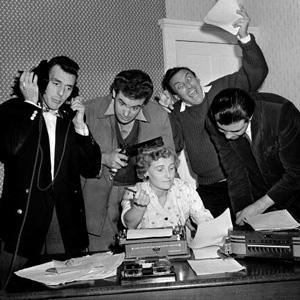
When we later got involved with a script-writing office, we became directors of this office [Associated London Scripts], about two or three people did what we tried to do, getting a job with Muir & Norden in their office to learn how to do it and become writers. I mean, our now agent's then-husband got in that way. He got in at the postal department of the office and became a writer of sorts, and two or three others joined the club. One of the Glenister brothers, the actors, joined as an office boy and became an actor. So we weren't far out! It was a way of getting into the industry, it's just that we didn't get in that way.
Of course now plenty of people write to us and ask us how to get in, and we send them virtually the same letter as Muir & Norden sent us 60 years ago!
Ray: Although you can't get in touch with Gale Pedrick now...!
Alan: No, unfortunately not! We used to give them the name and address of the various script editors, if we know them. And we feel quite happy doing that because that's the way we got in. And all this happened before the time we were 22! Never had to go back to work - I'd been back at work [after the sanatorium] getting six quid a week working, and Ray got fifty bob for doing fuck all! But yeah, after I'd been back at work for about six months is when we started writing, and that was it.
Ray: The amazing thing is, not to dwell on it, but what must have made such an impression was the amount of time we spent in the sanatorium. You know, people now quite rightly moan if they're in hospital for a week or something like that, but I was in there for three and a half years! That was the growing up period; Alan was the same, although in two different places, but that was our growing up period, about 16 - 20 years old! You're bound to be a little different, have a bit of a different take on this or that. [chuckles]
Alan: The way it manifests itself mostly is not necessarily emotionally but intellectually you grow up very quickly because all the time you're dealing with and talking to people much older, you see. So you're talking about adult things to adults. Whereas usually when you're 17, 18, you're just mixing with other 17 and 18 year olds.
Ray: And of course we didn't get any crumpet either!
Alan: No, didn't get any crumpet, and as I say didn't grow up necessarily emotionally, but intellectually certainly. We were reading far more - and also they were adult books, I mean I was reading adult books from a very early age, adult intellectually. The sort of stuff you'd wait until you were about 30 to read, we were reading those at about 18. And that way you mature. You miss your childhood and your teens and that aspect of it but you do ... there are compensations, in as much as we were writing intellectually adult material at 22 years of age, and writing for comedians who were old enough to be our fathers! So it was a wonderful turn-around from really being despairing at living, even, that really our lives started at that time. And here we are!
Ray: That's what a lot of people seem to find so intriguing, that we were so young.
Alan: Of course, when we started, there weren't too many writers about so we got in quickly because they were desperate for people and there weren't many people doing it, whereas now it takes ages to get in. And if you want to be a comedian now, there's bloody hundreds of them.
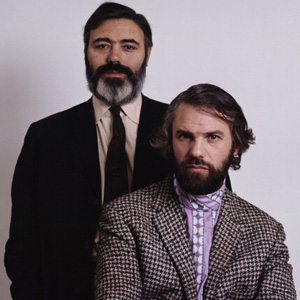
Ray: Most comedians write their own stuff now too don't they?
Alan: And they have to wait ages [for success]. Paul Merton, a great friend of ours, is a big star now but has only been so since he was about 30, not 20! So it's much longer to get into the industry. There are not too many 21, 22 year-olds writing now!
Ray: By all accounts a lot of it is down to how things are structured these days, you know, they've got committees about everything. But who are the people on these committees, what do they know? What experience have they had?
A number of people we know keep having meetings with the BBC, and it's "Ooh they're very excited," "Yes, they're very interested," "They've now committed money" - but nothing! Nothing ever happens!
Alan: I understand also that now all these committees are split up into age. So they've got one for 18-25, another 25-35, one for old biddies... and it's "will this appeal to that group or that group?" - well in our day you just did it and hope to appeal to them all! We still have people writing to us who are OAPs, and 14-15 year-olds.
So do you think that the career structure for comedy writers has changed a lot? It used to be the case that there were pre-established star names to write for, whereas now most comedians seem to want to write for themselves. Has the role of the comedy writer become diminished?
Ray: Oh it must have done I suppose. I mean, listening to Radio 4 quite a lot, there's quite a lot of new comedy put on there, mainly young people, and even if there are a lot of people in it, you find out they're the writers anyway. I don't think there was anything like that [when we were working], was there Alan?
Alan: No, and there's a good reason for that. All the comedians, even if they'd been able to do it, they were all working on other things. They were nearly all on the music hall circuit - people like Tony Hancock - all the comedians were used to playing twice nightly, six or seven days a week. So it really wasn't possible, time-wise, for them to write their own scripts even if they'd been able to.
One or two did - Eric Sykes always wrote his own stuff, and Eric Barker always wrote his own stuff, but then he didn't go on the music halls. Spike Milligan did, to a certain extent, he wrote about 80% of his own stuff, a lot of the time with other people, The Goon Show with Larry Stephens for example.
But the point being that even if they wanted to, most comedians couldn't. And that's when the business of script-writing started. Writers, you know, they had to... well, comedians had to find material! But nowadays there is no music hall so most of their routines they cobble together themselves, or maybe they write with a friend.
Frank and Denis, Ted Kavanagh (who wrote ITMA), and people like Val Guest - he was a writer and director who made most of the Will Hay films - but he was very young, he was about 18 in the 1930s when he started writing for Will Hay!
The big thing that happened was when television took off and comedians stopped working on the halls because they had to rehearse for television shows. Then the halls started closing down, television killed them off, they became things like bingo halls and strip shows! And radio of course, they needed writers for their radio shows because again, they didn't have time, even if they were capable. I mean, Hancock couldn't have done it anyway so he had to have his scripts written for him. Most of them were like that, Jimmy Edwards and the like, they'd all have their shows written. Charlie Chester used to write quite a bit of his own, with the help of others, but there were very few of them.
So when we started there was only one television station, BBCtv - ITV didn't start until the middle 1950s - and it only broadcast for about 3 hours a day, so there was no call for masses of material...
Ray: I suppose we knew practically everybody who was a scriptwriter! There weren't many, but when we started when knew them all, and the ones you didn't know you hadn't heard of what they'd written. There weren't many of us, probably less than 20.
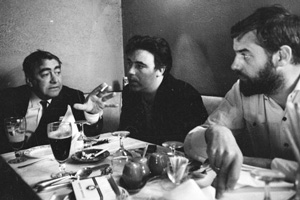
Alan: We started our agency in 1954 and that gradually built up as more and more writers filtered through; they graduated either to our agency or to Muir & Norden's agency.
Ray: Also by that time, the income, the wages and fees paid started going up, making it more attractive to people.
Alan: The first four years of our career were entirely radio. Various sitcoms; Hancock's Half Hour started in 1954, before that we were doing sketch shows but it was all radio. We went over to television in 1956 just after ITV started, but we did mostly - nearly all - BBC work. As Ray said, the remuneration became more and more...
Ray: ...attractive to people, especially in universities! It's true that the universities already had Footlights and the like, but generally they were either playwrights or actors, but not scriptwriters.
But then, as television grew, you had more and more channels, especially considering ITV was split up into regions all producing their own stuff. So it's very different now.
When you were at you busiest, you were writing around a script a week for long periods...?
Alan: Our most productive year, we did 40 scripts in the year, in the late 1950s. Enormous!
Ray: Nobody told us not to!
Alan: And we still took a month's holiday...
...these days scripts are often reshaped for months before being deemed worthy of recording. What are the plusses and minuses of having to work to such strict deadlines? Were some of your best scripts produced under this pressure?
Alan: Didn't have time for such nonsense!
Ray: Deadlines are ... well, arbitrary really, aren't they? If you had notice that you were going to do a series, that maybe you'd just finished one and were told that the next series would be in the autumn or something like that, so you had some time between then to think 'when shall we start writing it'. Well, if we were doing something else, we didn't start! But if we didn't have anything else then we'd start writing before the shows started [being recorded]. You may have three or four in hand by the time the actual series started broadcasting, but we'd soon lose that advantage. It'd peter out so that by the time we were half way or three quarters of the way through, they were waiting for the scripts to come in!
Alan: And of course on television, they've got to build the sets unless you're in the same sets every week. Like Steptoe, if you move out of the yard and go somewhere then you've got to build the set, so the scenery department have got to have notice. Radio didn't matter so much; in the early days of radio we were sometimes rewriting up to about an hour before it went on and handed the actors the scripts as they were talking! You could get away with that on radio.
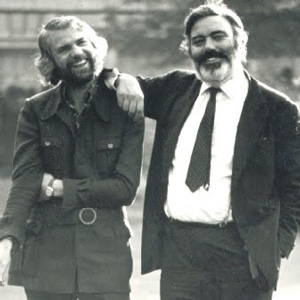
The other thing about deadlines is that it's a bit like Parkinson's law, you know? If you've got six months to write a script, you'll take six months. If you've got six weeks you'll take six weeks. I wouldn't say you could write a series in six days, but we have been known to write a show in four hours. Once! But other times we've taken three weeks to do the same amount of writing, and that's working every day at it. But that's the art; you can't tell which is which: which is the script that flowed and which is the one that was dragged out of your body. As Flaubert said 'word, by every word, is torn from my body'. But that's just the art of writing, that you can't tell which is which if you look at our scripts.
But generally speaking we'd take about 6 months to write a 6, 7 week series. Sometimes we'd spend a week just trying to think of an idea for a show.
Ray: We were also trying to do TV and radio at the same time!
Alan: Yes, for about 3 years, from 1956 to 1959, we were doing about 40 shows a year, radio and television. Nobody told you that it couldn't be done! If two writers now said that's what they were going to do, people'd say 'You must be mad, you can't do it'. That's why in America they have teams of writers, 10 or 12 writers for a series writing 24 shows. Impossible for just two writers to do that.
Ray: That's another reason why English shows never took off in America once television came along. They'd say "Oh, you've only got seven...?"
Alan: When we started in the 50s, an American series consisted of thirty-nine shows! Every Bilko series, everything was 39 shows! They'd have 12 or 13 weeks off a year and then the next series would start. But nowadays it's 22 or 24. Half a year, six months. Well 39 episodes, that's impossible for two writers, so they'd have teams and each team writes 8 or 9 shows. That's fine, but it does take away a certain personal touch, it becomes a bit more of a factory. But the one thing it does result in, I always think, is really lean scripts. If you read an American script there's hardly any speech longer than maybe two sentences. If you read a Hancock script sometimes a speech will last a whole page! Americans would say "Whaaat? What's this?" and cut cut cut cut cut.
Ray: Same with the films. Our cameras linger longer on people than theirs do. It's attention span as well.
Alan: They would say 'Don't need that line, too much fat on it'. Of course our film scripts were probably OVER-written. It makes it difficult to cut.
A lot of comedy writers cite your influence in shaping the style and form of the classic British sitcom. Do you see your influence in any comedy writing today, and which of today's comedy writers - if any - do you admire?
Ray: We want money for that!
Alan: Oh my gawd! Well there are lots. Ian La Frenais and Dick Clement. Andy Hamilton and Guy Jenkin. Outnumbered is wonderful. You can see sometimes the kids looking off camera, but it's wonderful the way they do it, it's like Marlon Brando, just looking around! You can tell they're looking at someone behind the camera but they do it so naturally it doesn't matter. The little girl is so good.
Both Hugh Dennis and Claire Skinner, the grown-ups, are great. He's a comedian, The Now Show, and with Dara O Briain on Mock The Week... He's a good actor, you see. He's one of those rarities, very seldom do you find comedians who are good actors. Hugh Laurie is also, he's turned out to be an incredibly good actor. And Dylan Moran's a good actor too. In our day, generally speaking, comedians were terrible actors! American comedians were good actors, but I mean, Frankie Howerd was a terrible actor - although he got away with it.
Tony Hancock was a good actor in a way, but he'd have been better if he'd done more films. Learnt how to do it. Will Hay was very effective in films, but so many of them can't act.
Of course another change, when we started, is that sitcoms were done by comedians. You didn't have actors in it; actors acted and did straight stuff. Comedians comedied! One of the things we did, we were some of the first writers to bring more straight actors into the comedy world. Particularly with Hancock as he worked so much better when people were playing straight around him.
Ray: After Hancock, we decided what we really wanted to do was make a comedy series with actors mainly. Because, you know, British actors were good at comedy. So that's what we did, to a certain degree.
Alan: It's strange how things change. In the 50s all comedy shows were with comedians, nowadays you seldom see sitcoms with comedians. Most are actors. Completely changed around.
As for what influence we've had ... well, that's for other people to say really! All I'd say is that everybody is influenced by somebody. We were influenced by the Americans, and in this country by Muir & Norden, so one hopes...
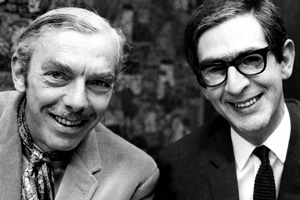
Ray: Muir & Norden were the sort of 'grand-daddies'. And at that time Take It From Here was so well written. Also, in the English world, they were the first ones to start putting esoteric things in to their comedy. The BBC would probably have said to them 'You can't say that, they won't know what you're talking about' - but they said 'Oh yes they will' and did it.
Alan: They gave their audience credit for some education and intelligence! They were a great influence on us.
Ray: They were very intelligent scripts. And that's why such things last so long.
Alan: A lot of writers have told us that they were influenced by us of course, by what we did... I suppose the thing is, we were one of the first to make sitcom, to make the storyline run the whole length of the show without any interruptions. Nowadays that goes for every show. But in the early 50s every show was interrupted by a music item. You'd probably have a single storyline, but it was broken up into Act One, Act Two, Act Three.
Ray: The Americans were doing the same too.
Alan: Yeah. It was still a storyline, but we did away with all of that. Nowadays you'd never dream of having music half way through a sitcom!
Would you say those earlier forms of sitcom were still a bit more like variety shows, with the musical interlude, rather than a form of its own?
Alan: Well, there was still a storyline. Although shows like Take It From Here were comprised of three separate sketches. Also the sort of shows we were doing, if you had a star comedian in it, he would be expected to start with a monologue. We did a show called Calling All Forces with Charlie Chester and he'd start off with a 2 or 3 minute monologue.
Ray: Afterwards, when Hancock took over, we did away with that!
Alan: I suppose they were all sketch shows.
Ray: It was all based on tradition; what came before it, what did they do years ago. Do that if it worked.
Alan: The other thing with all our early shows was that we were lucky in as much as, the type of work required, we were still learning the trade. Not having had an apprenticeship, we had to learn on the hoof. During the first four years of our career we wrote for just about every comedian in the country. They'd come on these shows as guests and we had to write the material for them, interplay with Hancock or whoever...
Ray: It's not something writers have to do now.
Alan: No. We had to master different styles. One week we'd be writing for Terry-Thomas and the next, Jimmy James, the next week Charlie Chester. Ted Ray... Robert Malton, I mean, all different types of styles and types of comedy and we learnt how to do it, we learnt our trade on them. Great apprenticeship of being paid to learn our trade! Nowadays writers don't get that chance.
So who was the most natural person to write for? Who interpreted your scripts in the best manner, and vice versa, was anyone particularly difficult to write a voice for?
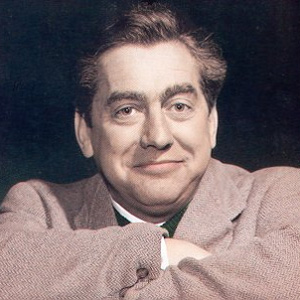
Ray: I suppose Hancock!
Alan: In the first instance: he was the best probably. The best out of the comedians.
Ray: Yeah. Because we wrote so much for him we pushed him in all directions. Obviously you can't do that with people you write for only once or twice. Then Steptoe And Son I suppose. Harry H. Corbett and Wilfrid Brambell - but you don't call them comedians, they were actors.
Alan: No, they were straight actors. They'd never done comedy before they did Steptoe.
Ray: We pushed them about a bit, yeah.
Alan: They became a bit mannerised in certain respects, but when they started they were just two actors playing the parts. We did another series with Les Dawson [Dawsons Weekly] and we had to work on him, purely because of his self-confidence. He wasn't sure, he wanted the safety net of gags, laughs. "Face like a sack full of spanners", that kind of thing. He used to try to slip them in, and we'd have to say "Hey Les, it spoils it to put them in" - and he saw the point. But it was only because he wasn't sure.
Ray: In the end he said it was the best thing he ever did, but it certainly didn't get the audience that we'd hoped for because, there again, it was done for Yorkshire and it never got networked! They [ITV companies] used to barter with each other: "you take a bunch of our shows and we'll take a load of yours", so if one didn't like something it'd be "oh well you're not having that other one then". Or they'd go out at different times. Instead of going out at peak times all over the country like a BBC show, they'd be at different times - or at least with ours they did.
Alan: Never got into the top 10 because it'd be something like 7:30pm to 8pm in Yorkshire, 8:30pm to 9pm in Scotland, and on Tuesday instead of Wednesday somewhere else, so the figures all got fragmented.
Ray: I remember once the BBC, as an experiment, broadcast Steptoe And Son against Coronation Street. Knocked them both out. They'd been number one and two [in each week's television ratings]. Steptoe was the only show that ever knocked Coronation Street off number one.
Alan: So it was one and two week-in, week-out: Steptoe one, Coronation Street two; Coronation Street one, Steptoe two. Then one day some bright spark at the BBC said "I know what we'll do, we'll put Steptoe out against Coronation Street - and for the first time, both shows weren't even in the top 10! It went on for two or three weeks like that before someone decided they must be mad. They went back to putting them out on different nights and immediately both shows went back to number one and two.
Your Hancock episode The Blood Donor is widely regarded as perhaps the single best episode in the history of British sitcom. Is there anything you thought more of, that you've felt to have been overshadowed by those immortal words, 'Why that's very nearly an armful!'?
Alan: When one's asked about favourite shows or favourite lines especially, sometimes lines you remember come from shows that didn't stand out particularly. Bits and pieces, certain scenes stand out, you know?
Ray: The other funny thing is, shows that we've regarded in the past as 'Mmm, let's draw a line over them', because they were very early, they're the favourites of the Tony Hancock Appreciation Society! And I go "What?! You're kidding!" They love it! So you don't know what to say.
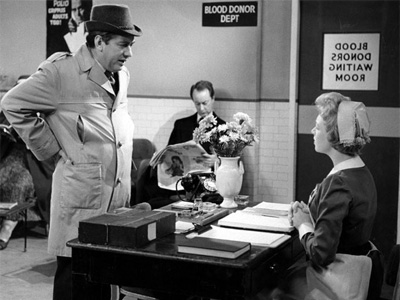
The funny thing about The Blood Donor is that Hancock had had a car crash that week and the BBC had cue cards for him. He'd banged his head, the BBC gave him the option of cancelling, but Hancock said he wanted to do it. So it was suggested he have the 'idiot boards' just in case, as he'd lost two days' rehearsal time.
Alan: And he found it such a relief that he didn't have to learn the lines, that as far as we know he never learnt another line! So that was the beginning of the end for him. When you start doing that...
He'd say "Americans do it, they all work from idiot boards", but it's a different type of work. Shorts. They'd work in bursts. They didn't work like Tony.
Ray: The other thing about America is that the writers would be giving the actors new pieces during the breaks in recording! When we found that out we were rather contemptuous of British actors saying that "I can't remember any more!" Our producer, Duncan Wood, used to say to us on the final day of rehearsal, which was also the day of the recording, after about 3 or 4 o'clock in the afternoon, he'd say "No more! That's it, they've got enough to remember! Now go away and shut up!"
Alan: They wouldn't be able to learn the cuts either. If we wanted to cut something, they've got to learn the cuts.
Ray: Or un-learn them!
Alan: I think one of the best shows we ever did was Steptoe And Son's The Desperate Hours, which was based vaguely on the storyline of a Humphrey Bogart movie called The Desperate Hours - that's why we called it that. Similar situation. But that's because the cast was so good, you know, Leonard Rossiter.
Ray: They were mirrors to each other. The old man and the young guy; same as Albert and Harold.
Alan: I mean that was probably one of the best scripts that we did. The Blood Donor was a good one, but that's more of a favourite. And of course The Twelve Angry Men is another very popular one, some very memorable lines in that, you know the 'Magna Carta' line and things like that. Just recently it seems to have been quoted a lot straight, by political columnists!
Ray: "Magna Carta, does she mean nothing to you...?"
Anyway, yes, the things that are the favourites with you are not necessarily the best scripts. Sometimes, as I say, people love certain programmes and we say they're terrible, not wonderful, but that's what they liked. Then again I'm not saying that because we didn't think much of them and they did, that doesn't make them the best scripts. So maybe the best scripts were always the funniest shows.
There were scripts when Harold Steptoe was going to put Albert into a home, and the old man's looking out of the window... there wasn't a dry eye in the house! That's not funny, but it still did get a laugh. A funny programme.
Alan: So there's bits and pieces. Not necessarily a whole script.
Ray: It's not really a thing we analyse very often, or perhaps at all! What's our best script? No, don't know, never really thought about it. So there's a first!
Alan: The ones that Hancock did on his own, without Sid, a whole series - there were four that we were particularly pleased with, The Radio Ham etc.
Does it annoy you, just how many of your shows are now 'missing believed wiped'?
Ray: Well, it's very annoying, yes.
Alan: At the time we didn't think about it because we didn't know that there was a market. Everybody suffered the same thing: the first series of Peter Cook and Dudley Moore's show disappeared. Loads of stuff disappeared, it was just par for the course. But now, yeah. It's a great loss.
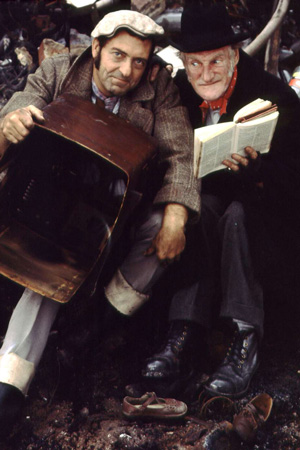
The thing that annoys me most actually - I'm not surprised that some of the Hancocks didn't survive, I mean the first series was done live anyway - but what does annoy me still is that the BBC, just through sheer inefficiency and bureaucracy, lost the fifth and sixth series of Steptoe, and so consequently they exist now but only in black and white, having been made in colour! And since the BBC don't like using black and white, that means that there's two series that don't get played.
Ray: [chuckles] And we don't get paid!
Alan: We had them in our own collection, but we only had them in black and white because we didn't have the colour systems. We had someone run us off copies of them, who worked at the BBC, for our own interest - and then it turned out they were the only copies that exist because the BBC lost the two series! They couldn't lose two series in black and white, they had to lose two series that were in colour...!
They kept all of the other Steptoes. A lot of the Hancocks just don't exist, and a lot of radio shows doesn't exist. We ascertained there are 26 television shows and 30-odd radio shows that don't exist anymore. We've got the scripts but the actual shows don't exist. We did 101 radio Half Hours, of which there were about 70...
Ray: What, Hancock?
Alan: Yeah.
Ray: Hundred and one?!
Alan: One hundred and one, yeah.
Ray: Bloody hell!
Alan: We did 101 Hancocks and about 58 Steptoes. Or 56 and 2 hour-long specials for Christmas. They all exist, but Hancock, the radio; a lot of those don't exist, and the 26 television shows... We also did a television show with Jack Hawkins, and three Half Hours with Harry Secombe.
Was Harry playing Tony in those three shows, or was he himself?
Alan: First one he was. That script had already been written. Tony'd disappeared, so we re-wrote the first page to explain why Harry Secombe was there. It said "Ladies and Gentlemen, we present: Harry Secombe, Sid James, Bill Kerr and Hattie Jacques in ... diddle-ee duh-da-duh ... Hancock's Half Hour". Then we explained what he was doing there, and he did the script as written. Fortunately it was one of the ones that as soon as you got over the fact that is was Harry's voice, it didn't matter because it was all about smuggling stuff in from France.
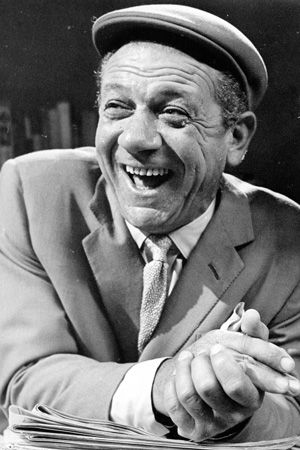
Numbers 2 and 3 were written knowing that Harry was going to do it. Not that I think it made any difference really. Then number 4, Hancock came running back and so we wrote one where Tony, Sid and Bill go down to Wales to thank Harry for standing in on the radio show!
It must have been immensely frustrating for Tony to just disappear like that, knowing a new series was about to be recorded.
Ray: Well, yeah. We found out later that the BBC knew exactly where he was all along. We always thought he'd gone to France, but he went to Italy. There was somebody in the police force, he was at the airport or something and heard or saw where Hancock was going, and told the BBC.
Alan: He had a history of doing runners. From the theatre a couple of times he'd disappeared for a few days then came back. I think also - I'm not sure about this but I've got a feeling - that he was also doing a theatre and it was probably the theatre he was getting away from and not the radio show. There was no reason why the radio show would get on top of him, all he was doing was reading the bloody thing. But the theatre used to get on top of him, I think he was still appearing in the West End and was getting away from that. It just so happened he was due to start the new radio series at the same time.
So you are now by far best known for Hancock's Half Hour and Steptoe And Son, but they're far from the only titles you wrote. Is there anything else you wish was more well-known or more fondly remembered, or is there even anything you regret having been involved with?
Ray: Yeah!
Alan: The only flop, the only out-and-out flop we were involved in, was quite early on in our career. It was called Hit The Headlines and it cost a fortune to make. They took over two studios to make it, and it lasted about two hours - a musical, and it was terrible.
Ray: You don't regret it though do you?
Alan: Yeah - perhaps not so much having done it [for the experience], but being involved with!
Ray: Well I don't! Don't regret it [he chuckles], not at all!
Alan: Well it was dreadful anyway.
A good experience but bad end product?
Ray: Yeah. I don't regret that, but what I do regret was that some shows were written apart from myself and dear Alan! But, uh, you know.
There was a series that I wrote with Johnny Speight called Spooner's Patch, and another - two series, I think - with John Antrobus, Room At The Bottom, which I'd like to see again, and I wish it was around, yeah. But ITV are very bad at doing anything like that, putting them out. I still see the star, Keith Barron, and yeah, we had a very good cast. Did that from Yorkshire Television, that was good.
Are there any other programmes you'd like to see released on DVD or CD?
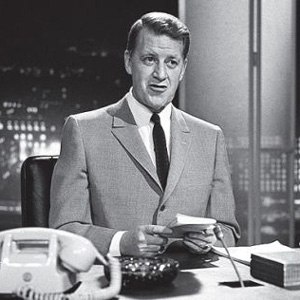
Alan: Well there was a radio show, the very last series that Bernard Braden did. It started as Breakfast With Braden, which was on on a Saturday morning; then it became Bedtime With Braden, obviously on later at night; then it became something else; and the last series, which we did, was called Back With Braden, after a break I think of a couple of years. And we did about 16 episodes, which we really enjoyed doing.
Ray: Because he was always, you know, long before we ever wrote for him he was a great hero of ours. But he wasn't a great hero of the public for some strange reason! His wife was, Barbara Kelly, she did lots of quiz programmes and things like that. They liked her but they didn't like him so much, and I don't know why. I don't know whether it was because of his accent - Canadian - but it was quite nice I think.
He was quite sophisticated, did programmes without an audience, but the band used to laugh. But it really appealed to us, I suppose because he was a bit slick, you'd call it. He knew he was playing to a small audience, everybody knew he was playing to a small audience, even for radio. But it was a thing that all writers liked, even if the public didn't particularly. It had its audience though, and it was very good. Very good, we enjoyed that, enjoyed writing that and working with him. Lovely man, lovely man to work with.
Alan: Great technician. Very good technician; great timer... He used to have his own radio show in Canada which he'd produced, written and directed, so he was a radio man right the way through.
We did quite a lot of work with Frankie Howerd too. Did two television series and a couple of radio series, during which we wrote for some of the biggest names in any medium: Richard Burton...
Was Frankie good to work with?
Alan: Yeah, great! Could be a little trouble at times, but no he was tremendous. Great in those days, very very popular, great value, and very unique! You'd never mistake Frank. A one off.
Ray: When we split with Hancock, Tom Sloan at the BBC [Head of Light Entertainment] said to us "What do you want to do?" and we said "Well we'd like to write a series for Frank." He said "Oh you're not doing that!" - it was thought his career was finished.
But we'd always known Frank, right from the day we came into the business, more or less. He was always around, he was always good about writers and getting new writers to write for him. Some lasted, some didn't. But it didn't put him off. He was very good at giving writers a chance.
Also he was part of our organisation for a long time, and we did a stage play called The Wind In The Sassafras Trees, and it was all about - well, we called it an indoor English western. We opened in Coventry and it was a huge hit. Huge. We had a lovely American producer who lived over here. Lovely man, and he was in partnership with David Merrick, who was the King of Broadway. The most successful, powerful man on Broadway, and he came over to see it. We had dinner afterwards and he said to Frank "Okay, where do you want to go? We can go to London or New York. Which one do you fancy?" Well Frank said "I've got nothing more to prove in London, I'd like to go to America."
That was a big mistake. We opened in Boston; the theatre was very confident about it all. Nearly all the theatres out there were subscription theatres - everybody had a seat, a ticket. But the Americans only go by what the critics have to say. If the critics say it's crap, or just not very good, they won't go. They don't want to be seen wasting their time. And so we opened in Boston and they just didn't understand Frank at all! They said they couldn't understand him being funny, and he certainly can't act very well. It was a complete mystery to them. They didn't like him. When the review came out on the Tuesday morning, it got worse. They'd just sit there staring at him.
Alan: They all still turned up because they'd paid for their tickets with the subscription. But he was playing to a full house - a full house of silence.
Ray: I think it was there, they got the idea that we were taking the piss out of America and Vietnam. It was about a family of whites in this log cabin who were surrounded by Red Indians who were having a go at them. Who knows...
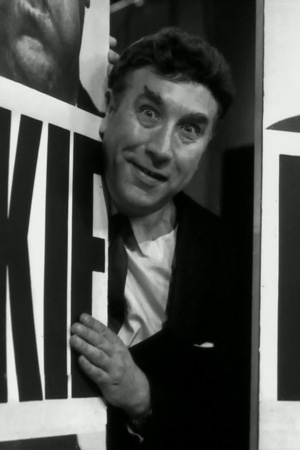
So anyway we moved to Washington D.C. and thought "Oh God, it's going..." and then we found out they'd changed the name from The Wind In The Sassafras Trees to Rockefeller And The Red Indians. Which is not a bad title really...
Alan: But not the same play! We re-wrote it as far as we could, re-wrote different bits and pieces...
Ray: And it opened there to rave reviews!
Alan: 48 hours later. Silence on Saturday night, then Monday in Washington, standing ovation!
Ray: And great reviews from a bloke who was known throughout America. Highly thought-of. He came down to this restaurant in his cape, and they said "If he likes it, he'll read his review to the restaurant." And he came in and he said "Oh hi!" and he read his review.
Alan: Well he was the one who said it was about Vietnam! He said "My headline is 'The U.S. as others see us'" and then he went on to say how it was a pithy statement, and everybody going to see it would be wowed.
Ray: So that was it, we thought "Oh only Broadway left now, we'll be alright." Until the day before the we left: David Merrick had had a row with the most influential stage critic in America, who was English, and he worked for the New York Times. That was it. Merrick said "The only reason I stay in this business is to kick the arse of this limey bastard out of this country!"
We thought "Ho ho, that's a good one, we wonder how he feels about that?", then we heard rumours that it was alright, they'd made it up, they'd had lunch and they'd made it up. Then somebody said "No, they haven't." So we went to New York, opened on a Thursday and closed on the Saturday.
He remarked about he knew and admired Frank, and us, but that he didn't like the show. There were various other reviews, some good, some not so much, but they were just waiting for this one guy. I asked what he thought and he turned round to me and said "Go home, son." - and that was that. But it was a bloody funny play! I'd love to put it on here soon.
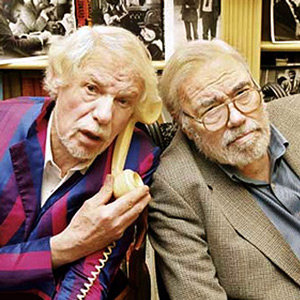
So that was Frankie in his known persona, not trying to play someone?
Ray: Frankie couldn't play anything other than himself!
Alan: He played Shakespeare's Bottom, and the jailer in the opera Die Fledermaus, but he was still playing himself.
Ray: But the thing is, they got him in Washington. And they possibly would have in New York if it'd had a great review instead of a shit one. So that was a great shame for Frank.
Alan: We did a lot of work with Frank over the years. And of course there was a lot we did under our own name [without any stars]: Comedy Playhouse, first of all, out of which Steptoe came. Then The Galton & Simpson Comedy, The Galton & Simpson Playhouse... we did two or three series like that for various ITV companies. Then I retired!
Ray: So watch out for a new Wind In The Sassafras Trees - or whatever it's going to be called!
Alan: We've done over 600 scripts. Nine films, I either wrote or contributed to. Two Steptoes, The Rebel, The Wrong Arm Of The Law, Loot, a couple of Frankie Howerd films, and one play and a revue ... what else?
Ray: Got a good memory, this bloke! I admire him completely for that.
Help us publish more great content by becoming a BCG Supporter. You'll be backing our mission to champion, celebrate and promote British comedy in all its forms: past, present and future.
We understand times are tough, but if you believe in the power of laughter we'd be honoured to have you join us. Advertising doesn't cover our costs, so every single donation matters and is put to good use. Thank you.
Love comedy? Find out more